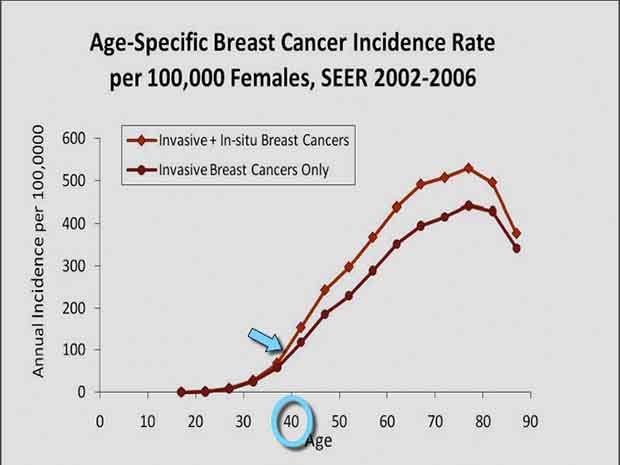Question: I have heard conflicting advice on when to start getting mammograms. Should I start at age 40 or 50?
Answer: Age 40, and here are two reasons why. First, look at the graph:
Notice the slope of the line is relatively constant from age 40 to 75. Nothing magical happens at 50 – the magic happens at age 40 – that is where the incidence of breast cancer begins to climb at a steady rate for women in the United States – that is why we pick 40. Second, there is a ton of scientific evidence that the types of breast cancers women get in their 40s are much more aggressive, so catching them early is even more important. Plus, these women have many more productive and valuable years to live. They are the cornerstone of their families. They want to be there to see their kids graduate from high school and college, see them get married, be there for the birth of their grandkids. These two reasons are why we recommend beginning at age 40 and not age 50.
Question: I am 75 years old and have heard that I do not need mammograms any more. Is this true?
Answer: I recommend that a woman look at her overall picture of health. If she is in good health and has favorable prospects for the next 10 years, then it makes sense to continue getting mammograms. Many women live well until 85 or 90 these days, and that is why I don’t like applying the age 75 recommendation arbitrarily to every woman. If a woman in good health at age 78 gets breast cancer, we can still catch it early and make the treatment a speed bump in that woman’s life, instead of a major disaster. She can go on to live another 10 or 15 quality years. But likewise, if at age 75 (or any age) an individual woman has multiple medical problems, poor health, does not get around well, then yes, chat with your doctor and discuss the idea of stopping your annual mammogram. Even if you do get breast cancer in a few years, you are more likely to die with it, rather than from it.
Michael J. Ulissey, M.D., is a partner at the Breast Diagnostic Centers of Auburn and Federal Way. He received his medical degree from Texas A&M University, College of Medicine and subsequently served as a physician in the U.S. Navy. His career since has been a mix of private practice, academic teaching and research in the fields of breast imaging, breast cancer and early detection. In addition to taking care of patients locally, he continues to participate in research as an Adjunct Professor at the University of Texas Health Sciences Center. If you have questions for Dr. Ulissey, you can reach him at Mike@breastdiagnostic.com.


